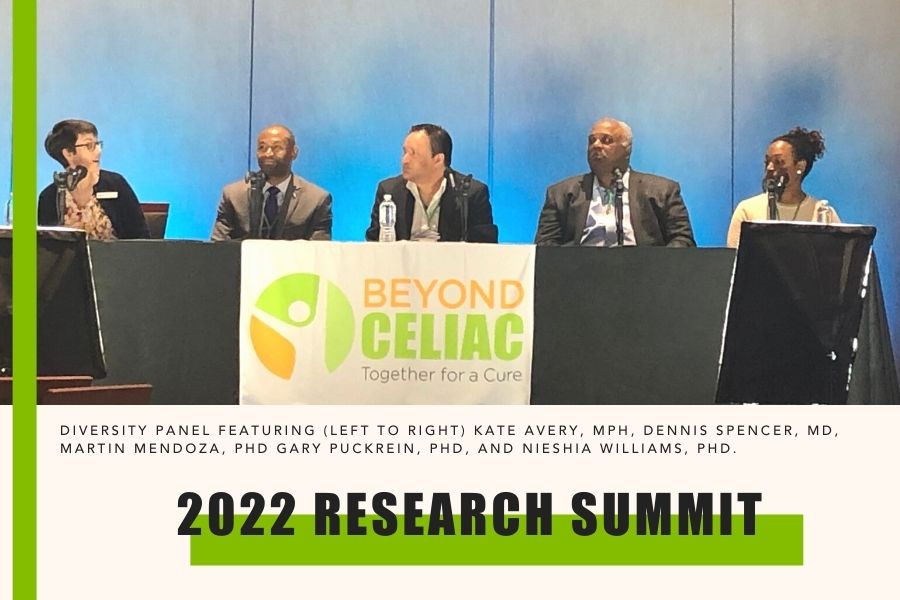
By Christina Heiser, a Reach Beyond Celiac Ambassador
Earlier this month, I had the opportunity to attend the 2022 Beyond Celiac Research Summit in Baltimore, Maryland! Not only was it great to connect with a few fellow ambassadors and Beyond Celiac staffers in person, but it was also exciting to learn about all the work being done by leading scientists, doctors, and pharmaceutical companies to get us closer to a cure.
The Summit kicked off the night of Tuesday, April 5, with a gluten-free dinner and keynote speech from Stacey Adam, PhD, the scientific program manager for cancer at the Foundation for the National Institutes of Health. Adam spoke about partnerships, focusing mainly on how so many different companies and organizations came together to develop a COVID-19 vaccine in such a short amount of time.
It was fascinating to get a behind-the-scenes look at how this all happened! (Of course, she also noted that there’s a lot of burnout in the scientific community because of how accelerated this whole process was.) Adam related this back to finding a cure for celiac disease: She highlighted the need for partnerships (and funding) across nonprofits like Beyond Celiac and major pharmaceutical companies as the way to make a cure happen.
After Adam’s keynote speech and a delicious flourless chocolate torte for dessert, it was time to call it a night. There was a packed schedule on Wednesday, and I wanted to make sure I got a good night’s sleep!
The Summit kicked off bright and early on Wednesday, April 6, with a gluten-free breakfast and opening remarks from Beyond Celiac CEO Alice Bast and Beyond Celiac Chief Science and Strategy Officer Salvo Alesci, MD, PhD. We then heard from a variety of doctors and researchers who study celiac disease and treat patients with it.
One of my favorite speakers of the morning was Marisa Stahl, MD, who won the 2019 Beyond Celiac-SSCD Early Career Award. Stahl is a pediatric gastroenterologist in Colorado who did a study on mass screening children for celiac disease. She explained that screening asymptomatic kids is controversial but that many of the children who participated in the study tested positive for CD without having the most common digestive symptoms or a family history of the disease. My big takeaway from Stahl’s study? Universal screening could be the best way to detect all cases of celiac disease and ensure treatment isn’t delayed.
At lunch, I sat next to Nieshia Williams, PhD, the founder of Golden Flour, a bakery in Washington, DC. Williams is an African-American woman who was diagnosed with celiac disease six years ago. She told me that doctors tested her for every autoimmune disease under the sun except celiac disease—she didn’t even think it was a possibility that she could have it. In fact, she thought she might have lupus, an autoimmune disease that is three times more common in African-American women than white women. It wasn’t until Williams met a Black nurse, who herself had celiac disease and suggested she get tested for it, that she finally got diagnosed with CD and had an explanation for her symptoms. We also chatted about Williams’ science background, which she said has seriously come in handy when trying to recreate her favorite baked goods as gluten-free. (I got to take home a few of her cookies at the end of the Summit, and I can tell you they’re absolutely fantastic!)
Williams spoke on my favorite panel of the afternoon: “Expanding Diversity in Celiac Disease.” She was joined by Dennis Spencer, MD, PhD, pediatric gastroenterologist at Boston Children’s Hospital; Gary Puckrein, PhD, president and CEO of the National Minority Quality Forum; and Martin Mendoza, PhD, director of health equality for the All of Us Research Program. The panelists spoke about racial disparity in celiac disease diagnosis, noting that minority populations are very underserved; Black patients and patients on Medicare are much less likely to be diagnosed with CD or receive a follow-up, they said. The panelists also spoke about the importance of training healthcare providers and ensuring diversity in clinical trials. “We need to understand the geography of where celiac is being diagnosed so we can go in and train doctors,” said Puckrein. Although there’s still much more to be done to improve diversity and inclusion in celiac disease, the good news is, the panelists said they can see progress is being made.
After this panel concluded, it was time to wrap up and head back home. I was so inspired by all the speakers who presented at the Summit and can’t wait to see where their celiac research takes them next!
You can view all the research panels and presentations on our 2022 Research Summit page or on YouTube.
Opt-in to stay up-to-date on the latest news.
Yes, I want to advance research No, I'd prefer not to